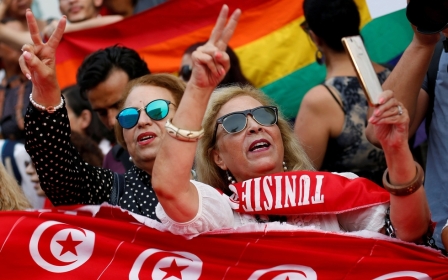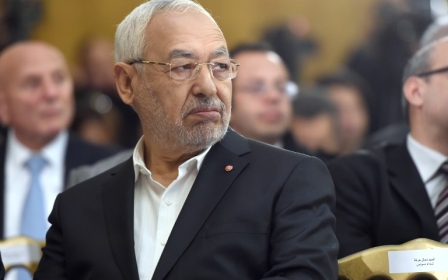Tunisia's political deals: How new power bloc may shift government balance
Tunisia’s parliament reconvenes on Monday, with the government alliance weakened and a new power bloc emerging.
Last week President Caid Essebsi signalled an end of the alliance between his secular Nidaa Tounes party and the Islamist Ennahda, which has lasted for four years.
Tunisia is regarded as the only successful democracy that emerged out of the Arab Spring: analysts say much of this is because diverse parties were able to agree a progressive constitution in 2014, then set up an inclusive governing coalition.
The current political crisis began when Hafedh Caid Essebsi, son of the president and the leader of Nidaa Tounes, suspended the party membership of prime minister Youssef Chahed and called for his resignation.
Hafedh Caid Essebsi said that Chahed had failed to handle the country’s ailing economy and accused him of attempting to form a new parliamentary bloc that would effectively end the importance of Nida Tounes in Tunisia’s politics. When he could not get enough support to sack Chahed, the president cut ties with Ennahda.
Chahed, who has been in office for more than two years, has led an aggressive reform programme, backed by the IMF, to control Tunisia’s deficit.
But his privatisation plans have been rejected by the powerful General Labour Union (UGTT), which backed Essebsi’s calls for Chahed to go.
The union, which represents an estimated five percent of Tunisia’s population and wields significant political influence, has called for public strikes on 24 October and 22 November.
New power bloc emerges
Chahed has enough support in parliament to withstand a possible vote of no confidence.
After the 2014 elections, Nida Tounes won 86 seats, making it the largest party in parliament. But since 2015, it has lost almost half its MPs and its parliamentary majority due to infighting.
Instead a new pro-Chahed bloc, called the National Alliance and consisting mainly of former Nida Tounes lawmakers, has so far attracted 43 MPs.
The president no longer has absolute power; his power is now constrained by virtue of the 2014 constitution
- Said Ferjani, senior Ennahda official
Once registered, it will become the third largest bloc in parliament, after Ennahda, which has 68 seats, and Nida Tounes on 47.
Ennahda has rejected calls to replace Chahed out of fear of a collapse in the economy, not least because Chahed is Tunisia’s ninth prime minister in only seven years.
Previous PMs have failed to address high inflation, corruption and unemployment, all of which were popular demands that sparked the 2011 revolution.
Essebsi said in a televised interview on 24 September: "The consensus and relationship between me and Ennahda has ended, after they chose to form another relationship with Youssef Chahed."
Ennahda said in a statement that it was still committed to “the path of consensus” as the foundation of Tunisia’s stability.
It emphasised the importance of holding elections, scheduled for 2019, and described the party’s relationship with Essebsi as “solid” despite several disagreements.
Said Ferjani, a senior Ennahda official, added that the alliance has not ended.
But he said that both Essebsi’s latest announcement and Ennahda’s response to it were significant because they showed that the semi-presidential system enshrined in the constitution is more powerful than Essebsi’s assertion that he has “de facto supremacy” as president.
“The president no longer has absolute power; his power is now constrained by virtue of the 2014 constitution,” he told MEE.
Power realignments
Analysts have ruled out an end to Tunisia's governing coalition and view what’s happening as a period of power realignments, the consequences of which have yet to play out fully.
Michaël Ayari, senior Tunisia analyst at the International Crisis Group, said: “For the moment, there is no break in the governmental alliance between Nida Tounes and Ennahda.
'The period of duopoly between Nidaa Tounes and Ennahda was somewhat stifling and didn't see any far-reaching reforms'
- Anthony Dworkin, European Council on Foreign Relations
“One needs to read between the lines. The breakdown is between Beji Caid Essebsi and Rached Ghannouchi, the president of the Islamist party, and maybe between the current executive direction of Nida Tounes and the direction of Ennahda,” he told MEE.
“It is not between the two parties as a whole, and last but not least not between Islamists and so-called secularists.”
Ayari said parliamentary votes will now determine the future of the alliances.
“If the Nida Tounes bloc takes a position different to that of Ennahda, we’ll be able to speak of a breakdown of the current parliamentary alliance. It’s not the case yet.”
Anthony Dworkin, senior policy fellow at the European Council on Foreign Relations, said that new alliances could be a positive development in Tunisia.
“The period of duopoly between Nidaa Tounes and Ennahda was somewhat stifling and didn't see any far-reaching reforms, so it's time for a new approach, even though that also entails risks,” he told MEE.
Relations with Europe
The EU, Tunisia’s largest economic partner, will continue to work closely with Chahed as it “broadly shares his reformist approach,” Dworkin said.
An EU spokesperson told MEE that the EU does not take a position on domestic politics, but that “it has a strategic interest in a democratic Tunisia that is stable and prosperous.”
Middle East Eye propose une couverture et une analyse indépendantes et incomparables du Moyen-Orient, de l’Afrique du Nord et d’autres régions du monde. Pour en savoir plus sur la reprise de ce contenu et les frais qui s’appliquent, veuillez remplir ce formulaire [en anglais]. Pour en savoir plus sur MEE, cliquez ici [en anglais].




